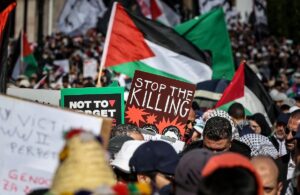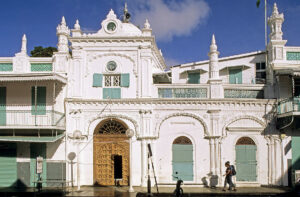
In an open letter, a dozen organisations say the kingdom’s human rights record ‘flies in the face’ of the spirit of global expo and would be used for whitewashing, writes Dania Akkad.
A dozen rights groups have urged World Expo 2030 organisers to drop Saudi Arabia as a potential host, saying the kingdom’s “abysmal” human rights record risks tainting the event.
In a letter sent to the Paris-based Bureau International des Expositions (BIE) this week, the organisations pointed to Saudi Arabia’s continued use of the death penalty, silencing of women’s rights advocates and targeting of dissidents abroad among a list of concerns.
“It is crucial that you recognise this as another attempt to whitewash the Saudi leadership’s past abuses and ongoing repression,” the letter says.
The kingdom is among four front runners, including South Korea, Italy and Ukraine, to host the World Expo in 2030.
First held in London’s Hyde Park in 1851, the global event has long been an opportunity to showcase the hottest innovations of the day. It’s the gathering where, for example, Alexander Graham Bell demoed the world’s first telephone and where television was first broadcast live.
Hosting is a major prize for the chosen city, drawing tourism and business and even the creation of historic icons such as Crystal Palace, the Eiffel Tower and Seattle’s Space Needle.
When Saudi Arabia first bid to host last year, Crown Prince Mohammed bin Salman reportedly pointed out to the BIE that the event would coincide with the culmination of Vision 2030, his strategy to diversify the kingdom’s economy away from oil.
Under the theme of “The Era of Change: Leading the Planet to a Foresighted Tomorrow”, Saudi authorities are said to be planning to turn Riyadh into “a world-class venue for global culture, connectivity and climate action” if they win.
But the rights groups say – like in its hosting of major sporting and entertainment events – the expo would be an attempt to distract from the Saudi leadership’s rights violations which “show no signs of decreasing and are not likely to cease with empty promises of change, innovation and mega development projects”.
Neom, Vision 2030’s flagship project, comes in for particular criticism in the letter. While Saudi Arabia has claimed the project will be an “accelerator of human progress”, the groups write, its construction has displaced tribes in the kingdom’s Tabuk province.
These include members of the Howeitat tribe, several of whose members have been sentenced to decades-long prison terms and execution on “trumped-up ‘terrorism’ charges simply for opposing their displacement,” the letter says.
Earlier this month, UN experts expressed alarm over the violations and urged companies involved in the project to ensure that they are not causing, contributing to or directly linked to serious human rights abuses.
Over the past two months, BIE has visited the four countries to evaluate their potential to host. The organisation’s executive committee is scheduled to discuss those findings this month before sending through viable candidates for a vote of its general assembly in November.
Zeinab Fayad, communications officer at the Geneva-based MENA Rights Group, which led the call to BIE, said it was critical to urge the organisation to consider the situation before the process went any further.
“If Saudi’s candidacy goes through and, worse, it ends up hosting the World Expo 2030, it will simply mean that the world is glossing over Saudi Arabia’s appalling record,” she said. “Saudi Arabia’s actions completely contradict the spirit of the World Expo.
Middle East Eye has sought comments from BIE and the Saudi Ministry of Foreign Affairs. – Middle-East Eye.


